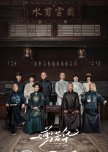
The Master of Cheongsam
20 mensen vonden deze beoordeling nuttig
A cut above.
This is a wonderfully produced drama that deserves a lot more attention. It is a riveting tale of sibling rivalry that spans a time of rapid change and turbulence in modern Chinese history. Jiang Mosheng and Lu Yuanzhi are both adopted and apprenticed by Master Su Jingan of Sancai (Triple Cut) House, couturier of the Qing Imperial Court. Sancai House routinely outshines other rival houses in the workmanship, symbolism and design of the intricate ornamentation of the Dowager Empress' court robes, allegedly due to their seamless stitch, a tradecraft that is passed down from one generation to another. Master Su's most bitter rival is his former fellow apprentice, Master Bai Henian of Sihe House.Jiang Mosheng is the older, steady, responsible brother and heir apparent, whose great talent is meaningfully enhanced by his passion and dedication. Lu Yuanzhi is the hot headed, audacious and visionary brother; a rare talent whose brilliance is nothing short of genius. His recklessness however lands him in serious trouble. To save him, Mosheng cuts ties with Sancai House, defects to Sihe House and accepts Master Bai as his foster father. This sets the brothers down a complicated path of reluctant rivalry, conflicting loyalties, mutual friendships, convenient alliances, mistrust, betrayal and forgiveness. The most prominent feature of this drama is the Abel and Cain relationship between the brothers and it is well written, consistent and riveting. Both of them are flawed characters and neither is completely blameless for how things play out between them. Although Yuanzhi learns to rein in his recklessness and temper as he matures, it still manages to get the better of him. His culpability over Mosheng's sacrifice constantly lingers in the air between them. Even though he can be such an ass, I have to sympathise with Mosheng's battle with his own worst instincts in the shadow of someone who is perpetually a cut above. Both Zhang Haowei and Hong Yao delivered excellent, empathetic performances, alternately frustrating, enraging and beguiling me at all the right moments.
How the design of the cheongsam or qipao evolves to reflect the changing attitudes of times is the main, fascinating centrepiece of the drama. While not in the same league as the more modern and sophisticated qipaos of Wong Kar Wai's iconic In The Mood for Love, all of the outfits from the Qing court robes to the Western flapper dresses are simply gorgeous and I truly enjoyed the mini history of Chinese costume. How the female characters are dressed is also symbolic of who they are - Yaoyao is a remnant of the past at sharp contrast with Lijun, the ultimate, progressive modern woman. Kang Ning sits in the middle - she embraces change in a way that marries it with tradition; and thus she is truly Yuanzhi's muse. True to character, both Kang Ning and Lijun have a very refreshing attitude towards relationships and love that I truly enjoy and they fight to write their own stories even when events conspire against them. The only character I didn't like is Yaoyao who is your typical c-drama archetype but she is written that way as a foil for the other two. There are enough dimensional, grey and consequential characters in this drama that I am very satisfied with the character aspects of it. Most of these key roles are performed by veteran actors whose acting often surpasses the quality of the dialogue. I laughed my head off at the dynamics between Lijun, Feiyu and her father.
This is largely a character driven drama where the main characters have to cope with the changing times as they transition from the Qing era to the Republican era and Japanese incursion. While the pace is fast with many exciting and unexpected turns along the way, not all of the sub plots and arcs are consistently well written. Some of the stressing events that the main characters face are a bit contrived, can be lazily written and at times defy logic. But between excellent acting and all the interesting character developments, I found the plot holes quite easy to forgive. I do appreciate how all of the characters go through rough times, experience loss, how actions have consequences and justice is often blind. The villains are decent but less interesting than the characters themselves, some of whom are quite grey if not outright vile.
I am happy to recommend this as a very enjoyable watch with some good fresh takes on old tropes. Overall for me this is an 8.0.
Vond je deze recentie nuttig?
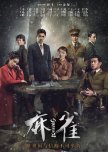
The enemy of my enemy is my friend.
This is the spy thriller that I will compare all other Republican period spy thrillers to going forward. It is that good. Each of the engrossing 61 episodes just flew by and I haven't been able to watch anything else since. I put this off for a long time due to poor reviews of the female lead's performance, which unfortunately is beyond dreadful. The rest of the cast however, is so phenomenal that they more than make up for it, to the point that the rating simply does not do justice to this drama.Set in 1940s Shanghai during the Wang Regime (Japanese puppet government), Chen Shen works for his best friend Bi Zhongliang who heads up the Special Operations Division. At surface, he is an indolent playboy, an aspiring barber until he was propelled into a position of favor and authority for saving Bi Zhongliang's life. In reality, he is a double agent loyal to the CPC. Things get complicated when his former student and true love Xu Bicheng and her husband Tang Shanhai are assigned to the Special Operations Division. The paranoid Bi Zhongliang eyes them with suspicion because Bicheng is his superior and rival Li Moqun's niece. He is already under growing pressure from both Li Moqun and their ultimate superiors, the Japanese for failing to capture the notorious communist spy Sparrow.
The overarching plot of this drama is rather simple and clean. The main communist and nationalist protagonists have just one mission; to steal the Return to Zero plan hidden within the Special Operations Division. The antagonists are aware of this and use this knowledge to try to trap them into revealing themselves and to capture Sparrow. The subplots and unpredictable way the storyline unravels with many twists along the way are largely driven by the characters as they react to stressful life and death situations that force perilous split second decisions. One of the weaknesses in storytelling is that the writers resort to coincidences and sheer luck a little bit too often to facilitate twists or bail the main protagonists out of tricky situations. Nonetheless it all comes together to deliver an intense aura of suspense that builds towards the thrill of unexpected victories, shocking betrayals, blindsiding plot twists and sudden death.
Chen Shen is the perfect spook - he is on the one hand an innocuous ladies man; a charming, stylish teetotaler who can't even bring himself to fire a gun. Yet he manipulates Bi Zhongliang masterfully; ruthlessly stoking and soothing his insecurities at the same time. This is by far the most fascinating relationship in the drama. Although he mistrusts Chen Shen, Bi Zhongliang is also touchingly sincere and protective of him. Chen Shen's feelings towards him are complex; they have an unusual bromance that pulls them together regardless of the fact they are on opposite sides. Chen Shen is not only the most intriguing character in the drama, he is also considerably more ruthless and manipulative than the main antagonists. This is by far Li Yifeng's most memorable role to date, well complemented by Zhang Luyi's disarming portrayal of Bi Zhongliang. The dialogue is sophisticated, pointed, witty and laced with sarcasm and dark humor that often relieves suspenseful tension with laugh out loud moments and encapsulates the complex character dynamics.
Even though I am a huge sucker for morally ambiguous characters like Chen Shen, there are almost too many moments where Zhang Ruoyan's Tang Shanhai eclipses him. And it is not just because he looks so incredibly scrumptious in a suit. Too often the second male lead is dumbed down to elevate the male lead. While it is true that Tang Shanhai is not quite the consummate spy that Chen Shen is, Zhang Ruoyun pulls this off without portraying Tang Shanhai as less intelligent; just a tad less ruthless, a tad less composed and a lot more heart. He is thrust into many parallel situations with Chen Shen but the way he processes and reacts to the situation, how he is clumsier at manipulation, how his remorse is more visible; makes it clear that he is a less hardened spy. His relationship with Chen Shen evolves from rivalry and distrust into mutual respect and a grudging friendship that compels the two to work together when their interests align. The enemy of my enemy is my friend is a recurring motivator in this drama that pits multiple characters alternately with and against each other.
The female lead, Xu Bicheng is by far the drama's weakest link. Unlike many, I don't think the writing is the problem; on the contrary I find the character to be one of the best written, most complex female roles out there. Bicheng is a flawed character; stubborn to the point of recklessness with a bleeding heart for lost causes who wears her heart on her sleeve. She is also often underestimated, can be very cunning, is a fantastic liar when cornered and is able to manipulate both Chen Shen, Tang Shanhai and Tao Dachun into doing what she wants and her character undergoes tremendous growth. None of these positive aspects are conveyed by the acting because Zhou Dongyu is a very limited actress who just lazily recycles the same four boring, mopey, terrified and pitiful expressions throughout the drama. The only things she does well is child ugly cry and child uninhibited smile from the heart. Which is wonderful... if she were playing a child. In this role, it is at odds with the role of a woman in her mid twenties, a spy and a married woman for crying out loud. It is also obvious no one ever told her it does not suit her naturally rather mature facial features and incredibly grown up styling in this drama. She fails so badly at projecting that je ne said quoi that has every man fall in love with her that its not even fitting to call her a Mary Sue even though she does need constant rescuing. I could not empathize with her at all and couldn't care less what happens to her.
Kan Qingzi was robbed - her Li Xiaonan stole the show and she really deserves top billing as female lead in this show. Her performance puts Zhou Dongyu's to shame even though the character is at surface, less complex and interesting. I normally loathe ditzy, lame characters like Li Xiaonan who are capable of loving wholeheartedly even when it is not reciprocated. But wow, she made me laugh, she made me cry, she made me respect her single-mindedness, I was 100 percent behind her. And that is what a good actor does, it is what every actor in this exceptional cast other than Zhou Dongyu managed to do - impress me with their acting and make me empathize with them even when they play dark or weak characters. Geez even Yin Zheng or especially Yin Zheng managed to make me empathize with his portrayal of the rabid, vicious, cruel and dangerous Su Sanxing.
A criticism of this drama is that love seems to have overshadowed the spy story; that the unrequited love trope is perhaps overused in this drama. While there is some truth to that, this is still very much a spy thriller that is chock full of excellent twists and turns. And the bigger point is that the unrequited love trope is used brilliantly to explore how each of the main characters bestows and responds to unrequited love in completely different ways. I normally approach Republican dramas with a stone cold heart - I go in pretty much expecting everyone to die it is just par for the course. In this one, too many characters still managed to steal my heart and made me bawl my eyes out. That said, the drama ends very fittingly after the final showdown.
My favorite line in the drama is Chen Shen's heartfelt "Please... don't tell anyone you were my student." This is by far the best Chinese spy thriller I have seen to date (August 2021). This is a 9.0 for me but I could easily rate it 9.5 were it not for the appalling execution of the female lead role.
Vond je deze recentie nuttig?

在下晴明 - Qingming is in the house.
在下晴明Yes! Yes! YES!!!
Qingming is in the house!!!
That is THE most striking difference between Yin Yang Master and Dream of Eternity, where I was like - Huh?...what??? Detective Dee?? Where is Qingming??? Where oh where is my yin yang master? THE Yin Yang Master? And in this Chen Kun just delivers the wickedly enigmatic and alluring essence of Qingming, a diabolically powerful, magical, misunderstood half human half demon that walks the world in between.
This version of Yin Yang Master's plot is much simpler and thus, better executed. It hones in on the life and death bond between a demon familiar shi shen/侍神 and their master zhu ren/住人. Falsely accused, half human, half demon Qingming is estranged from his zhu ren Baini and the Yin Yang Bureau. They reunite in a desperate attempt to recover an artefact that can set a powerful demon free; a quest that tests and lays bare their true loyalties and exposes past betrayals. Chen Kun and Zhao Xun's chemistry never fails to thrill, captivate and move me and they effortlessly convince me of their life and death bond. What I also love is that Qingming is not just uselessly waving his hands in the air reciting incomprehensible incantations. He really jumps into the thick of the fray in a way that leaves no doubt that he is in it to win it. In every life endangering encounter there is that nail biting sense of urgency, intensity and imminent peril. This fantasy world with its human and demon yao/妖 inhabitants has a very adorable, young adult and enthrallingly magical feel to it. In many ways, it captures the essence of Disney in that it speaks to two audiences both kids and adults with its clear message that both humans and demons can be monsters.
The only thing I really did not enjoy in this movie were the second leads - both actors were juvenile and did not deserve the screen time that they got. The animated characters like the Evil Red Ghost and side characters like the Peach Blossom Fairy were far more compelling and managed to capture my heart over those two jokers.
Overall this was a very entertaining movie - Chen Kun fans like myself will obviously be able to find many things to like and I can see kids just absolutely loving it. I rate it 7.5.
Vond je deze recentie nuttig?
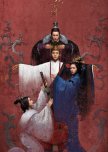
Secrets of Three Kingdoms
23 mensen vonden deze beoordeling nuttig
Sleeping with the enemy.
This drama weaves some of the most prominent historical figures of China's Three Kingdoms period into a fabulous and exciting tale of intrigue, adventure, and romance reminiscent of a Dumas plot. This is a highly fictionalized yet disarmingly convincing exploration of the motives and relationships of the key figures of the day that manages to stay broadly true to history.The last Han emperor has a secret that could shake the foundations of the empire and shatter his tenuous hold on power. Aided by a small intimate circle that includes the empress, his boyhood friend Sima Yi and a dwindling number of old Han ministers, he embarks on a desperate quest to escape the clutches of Cao Cao and restore the glory and power of the Han empire. But the cruel strategies and sacrifices needed are at odds with his benevolent nature and inclination to show mercy to his enemies. Ma Tianyu impressively pulls off a complex portrayal of this seemingly weak and powerless emperor who frustratingly sticks to his guns against all odds to ultimately succeed in winning the hearts and minds of his enemies with his enlightenment and magnanimity. It is very clear that the emperor and the notorious Cao Cao have very similar world visions and goals but their methods are extreme opposites - one rules by fear and sheer brute force while the other kills you with his kindness. Both are pragmatic and when the rubber meets the road, have little choice but to sleep with the enemy in order to achieve the outcomes they are after. We get to decide for ourselves who was more effective, who really won their epic struggle for power and whether it was worth it.
There are no real villains in this drama - even the emperor's enemies are portrayed in a very balanced manner though it is fair to say that the so called villains out-acted the heroes. Guo Jia is my favorite character in the drama - I often found myself rooting for him and oddly moved by his and Cao Cao's loyalty and affection for each other. And Tse Kwanho's Cao Cao must be by far the best Cao Cao I have ever seen - so cunning, powerful and menacing I was actually scared of him. Some of the most gripping and intense scenes in this drama are when Cao Cao and the emperor go toe to toe. My one big criticism of this drama is Han Dongjun's Sima Yi is shallow, boastful and unemphatic. For a highly rated actor to miss the mark on such a key character is just not acceptable. While some of the bromance moments with the emperor are decent, most of the time he is not in character and does not convincingly pull off the legendary strategist. Cao Pi is also extremely well acted but overshadowed by all the other outstanding performances. There is quite a bit of sizzling romance this drama, notably that of the emperor and empress as well as Guo Jia's but Sima Yi's was just kind of flat.
This drama is full of suspenseful moments and action as danger lurks around every corner. The second arc however is a bit draggy and requires some suspension of disbelief but that is also where the awesome Guo Jia emerges so don't abandon it there.
I will stop here and keep this short as it would be a crying shame to spoil this one. I highly recommend this very enjoyable and under appreciated drama that I would rate higher if not for Sima Yi
Vond je deze recentie nuttig?

The king maker is king of kings.
Note: There are some statements of well known. historical facts in this review. They are by definition not spoilers but be warned in case you are unfamiliar with the history of this period.Sima Yi, courtesy name Zhongda. History's most cunning grifter, a man who stole a throne and an empire more than once! I always enjoy dramas like this because they bring larger than life historical characters to life and deflate them into close to normal human beings. I never imagined Sima Yi would be portrayed as such a timid, groveling, deceptively harmless and well, just ordinary fellow. Or that he would be so terrified of his wife. That just cracked me up. Audacious.... sacrilegious even.... love it!
The drama opens with Zhongda, a brilliant scholar and tactician, welcoming his firstborn son Sima Shi into the world. His father Sima Fang is a shrewd and influential minister of the Han Imperial Court. By then, warlord Cao Cao had already openly seized power and repeatedly bullies the Han Emperor into a sniveling, terrified puppet. Zhongda unwittingly catches the eye of Cao Cao as he deftly extricates his father from a dire situation. He goes to extreme lengths to avoid serving Cao Cao who is both keen to make use of his talent and wary of it at the same time. Recognizing his innate cunning and ambition, Cao Cao regards him suspiciously as a double edged sword and comes close to killing him dead many times.
Initially I was surprised and a little bit underwhelmed to see such a timid and groveling Sima Yi. But the layers peel away very satisfactorily to reveal his hidden ruthless nature, his scheming and bold ambition. He is a king maker, someone capable of securing the throne for Cao Pi, the less favored son against Cao Cao's own wishes. He then proceeds to steal an empire for Cao Pi but this part seems whitewashed. I doubt Liu Xie was really that eager to so simply hand over the throne. Not surprisingly, he also intervenes in Cao Pi's succession plans. At that point, it is clear that Sima Yi the king maker is king of kings; that three generations of Cao rulers' succession is determined by this man. Notwithstanding his many contributions, Sima Yi is portrayed as a selfish and cunning character who parleys his own interests ruthlessly. He manipulates two revered ministers into sacrificing themselves to ensure Cao Pi's ascension, but it is clear his primary motive is to save his brother's life.
Sima Yi's great rivalry with Yang Xiu is rivetingly played out in the bitter succession battle between Cao Pi the worthy son and Cao Zhi the favored son. Both are ambitious and brilliant tacticians but they couldn't be more different in nature. Yang Xiu is arrogant, outspoken and extremely intuitive. He cannot help showing off, often over estimating himself and underestimating his enemies. This cost him his life and Cao Zhi the throne his father so badly wanted to give him. In sharp contrast, Sima Yi avoids attention and while he is is often underestimated, he has a healthy respect for his enemies capabilities. His final conversation with Yang Xiu, someone he empathized with, respected and learned from as a worthy opponent illuminates how Sima Yi managed to hang on to his head through many dangers. I have not watched Wu Xiubo before and I was hesitant about him as he is not the image that jumps to mind when I imagine Sima Yi. My concerns faded almost immediately and I cannot think of a better actor to play the role of Sima Yi as characterised by this production.
This drama largely sticks to history in terms of the key events and leading characters of the day. Told chronologically, the drama unavoidably peaks with the exit of the veteran actors who also play the most interesting figures of the day. This drama's highlight for me was Xun Yu's (played by none other than the fabulous Wang Jin Song) opposition to Cao Cao's decision to form his own feudal state. Their bittersweet final exchange that touched upon their long friendship, mutual respect and alignment that turned into reproach and disappointment is a powerful, memorable and compellingly acted drama moment that only two actors of such caliber can deliver. I can recommend watching this drama for that scene alone. I feel pity for anyone attempting the role of Cao Cao after Yu Hewei. I almost wept with joy at the perfection of his rendering of Cao Cao in his twilight years; the ambitious warlord stymied by the limits of his own mortality and torn by his succession dilemma between his most worthy son and his most loved son. Needless to say he is as bad a dad as he was as good a warlord and statesman. Ironically, Cao Cao sows the seeds of the downfall of his own empire as Cao Pi is also a terrible father who also messes up his own heir. Whereas the Sima family in sharp contrast are paragons of Confucian family virtue, the foundation of a moral society.
When it comes to the inner palace and familial relationships, the storytelling embellishes wild history and heavily fictionalizes the historically insignificant aspects. I was sad but unsurprised to see Cao Pi's deep friendship with Zhongda become distrustful and utilitarian after he becomes emperor. While I understand the audience appeal, it is well known that Zhongda's relationship with his wife was much less cordial but I love Liu Tao and was happy to buy into this Disney version. However the whole song and dance with Lady Bai and how Zhongda was "forced" to accept her went too far and just made me roll my eyes. I expect a man of that status in those times to have concubines I don't see the need to waste so much time suggesting he meant to be monogamous when he definitely was not. I also was not compelled by the chemistry between Cao Pi and Lady Guo but at least they didn't try to suggest he didn't have a harem. Lady Zhen's story could well just be speculative history but she is the character I felt the most sorry for in this drama.
The Advisors Alliance is the first instalment of Sima Yi's story and ends with Sima Yi retiring from active duty under Cao Pi. By then, Sima Yi and his proteges had succeeded in pushing through agricultural and structural reforms that made Cao Wei great and restrained the power of the Cao clan warlords. It is a fascinating account of how an understated and often under estimated Sima Yi was ruler in deed if not in name. His machinations paved the way for the Sima clan's rise in influence which eventually led to the founding of the Jin dynasty, which many still argue was not a legitimate state. I enjoyed this enough to rate it an 8.5 and will probably go on to watch the second season Growling Tiger, Roaring Dragon which focuses on his rivalry with Zhuge Liang.
Vond je deze recentie nuttig?

Demon in red.
Zhao Yao is a fun fantasy love xanxia drama where both leads belong to the dark or demon sect. The unconventional "good vs evil" plot challenges the idea of what is "good" and what is "evil" as the good guys are really the bad guys in this drama. The best thing about this drama is the sizzling chemistry between the two leads. What totally really drags it down is that it is littered with fillers - it should at best a 30-40 episode drama. That made me grumpy and is the main reason for the less high rating.Zhaoyao (Bai Lu) the female lead is an unapologetic bad-ass she devil who falls for the Demon King's son Moqing/Li Chenlan (Xu Kai). Li Chenlan is imprisoned by his father until he can free him from the powerful evil demon force within him. Zhaoyao is raised in solitude by her grandfather; it is their sacred duty to guard Chenlan until the Demon King returns. Led by the powerful immortal Luo Mingxuan, the righteous sects decide to preemptively kill Chenlan before he can wreak devastation on the world. Instead, they accidentally free Chenlan and an injured Mingxuan is rescued by Zhaoyao, who becomes infatuated by his chivalry and righteousness. She is outraged when she discovers his plans to kill Chenlan and boldly rescues him, earning his undying love in the process. She is captured and tortured by the thwarted Mingxuan and her freedom comes at a devastating personal price. Enraged and disillusioned, Zhaoyao forms and builds up her own formidable Wanlu Sect that wreaks havoc on Mingxuan and his "righteous" sects and protects those persecuted by them.
While recovering a legendary sword, Chenlan accidentally releases a deadly force that kills Zhaoyao. Boy is she pissed!!! She returns as an angry, vengeful but much weakened spirit that is hell bent on killing Chenlan dead. By then, Chenlan is practically invincible and it further incenses her to discover he has taken over as the leader of the Wanlu sect. This man enjoys living dangerously - he is so besotted with Zhaoyao that he is amused by and even welcomes her efforts to alternately kill and/or seduce him. The best moments are all centered around their occasionally funny and wholly adorable interactions. He is totally putty in her hands and cannot deny even her most dangerous requests. The sparks literally fly between them and their body language and obvious affection for each other is mesmerizing. All the early to middle episodes of them falling in love were the best and totally re-watchable. Bai Lu's Zhaoyao is just simply phenomenal - she is fiery, fearless, impetuous, occasionally wicked and completely bewitching. She also really brings out the best in all of her co-stars. However, outside of Bai Lu and Xu Kai, the cast is rather dull and didn't to engage me. Two of the other main female characters have a tendency to wail, which always has me scrambling for the fast forward/mute button. Sigh! When will they get it that wailing, whiny and noisy female characters are a nuisance?
The second female lead in this drama plays Qin Zhiyan (Yan Xiao), whose body Zhaoyao shares in the first half of the show while she tries to reclaim her own. The two are polar opposites yet form a strong and cute friendship. I wasn't wowed by Yan Xiao's overall performance, she got too much airtime in the first 20+ episodes that her cuteness turned into boring/whiny. The editing is sloppy - it jumps ahead, flashes back and in some cases explains what happens much later. I would rewind thinking I missed something that gets explained much later on - like how Mingxuan was out of the blue in a sealed state by Zhaoyao. I have FOMO so I hate fast forwarding but there were too many flashbacks and boring conversations between the righteous sects. Both the female and male love rivals were total cliches - they each sought to win Chenlan/Zhaoyao's love by killing off their rival. Wow -such a time tested losing and deranged strategy. The other main antagonist Jiangwu was an immature and swaggering pest until he redeemed himself slightly at the end. There are also a bunch of forgettable side love stories. The pace overall is painfully slow.
This drama went downhill toward the end. It didn't help that they randomly (and unnecessarily) killed off secondary characters. The ending was a bit rushed, garbled, messily executed and a bit wishy-washy when it could have and should have finished very strong. What is truly baffling is the countless wasted filler moments that could have been cut so that the ending could have been done properly.
I still recommend this but wouldn't bother to watch the whole thing. It wouldn't be a bad idea to drop it after Zhaoyao and Chenlan get together somewhere in the early 40s. Fast forward with impunity every time one of the two excellent main leads is not on. I will be looking out for more dramas with them (together would be great) and especially Bai Lu.
Vond je deze recentie nuttig?
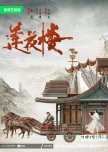
Ask me no questions, and I'll tell you no lies.
Mysterious Lotus Casebook is a dark 江湖/jiānghú story about the ultimately futile aspirations and obsessions of the martial world. In an epic battle for supremacy, Di Feisheng of the dark Jinyuan Alliance challenges Li Xiangyi, the leader of the righteous Sigu sect. Both men disappear from the martial world afterwards, leaving a vacuum at the top and their sects in disarray.Ten years later, aspiring young detective Fang Duobing comes across Li Lianhua, a famous itinerant doctor whom he is convinced is a quack. Determined to expose him, he attaches himself to Li Lianhua as inextricably as a wad of chewing gum in his hair. They run into Di Feisheng, who immediately recognises in him his old nemesis Li Xiangyi. The two old rivals remorselessly keep Fang Duobing in the dark as they try to figure out who sabotaged their fight and search for Li Xiangyi's deceased sect brother Shan Gudao's corpse. An unlikely friendship develops as they work together to solve a series of strangely connected jiānghú cases.
Plot wise, this drama is solid but dry and unremarkable. The cases all unfold at a fast pace and are easy to follow, but do not engage audience participation. They are simply plants for clues to a treasure hunt for artefacts that unlock the main conspiracy. Despite a hint of the supernatural, the cases fall short of chilling or suspenseful. The hidden mastermind behind the main conspiracy is pretty obvious and revealed fairly early on, and even the ironic twist at the end is not much of a surprise. Both villains are one-dimensional jiānghú archetypes driven by vanity and delusions of grandeur. Wang Herun's scarily convincing portrayal of the Saintess of the insane cackle elevated the role beyond its one-dimensional character blueprint.
\What makes this drama a success are fascinating main character designs, strong rapport among the three leads, the scintillating dialogues, and well-choreographed and exciting action sequences. The real mystery is about who Li Xiangyi was and why he was killed. The answers are at surface trivial. Li Xiangyi was perched at the top of the martial arts world as the world's best swordsman and leader of the righteous sects. This made him the envy and natural target of virtually everyone. However, Li Xiangyi was far from the perfect hero of Fang Doubing's idealistic imagination. In fact, he was a self-absorbed, pompous ass who believed the universe revolved around him and his worldview. His swordsmanship is matched by a brilliant, cynical mind and a razor-sharp tongue that, according to poor Ai'man, can slay a person with a few words. If there is one thing lacking in Cheng Yi's otherwise stellar performance, it is that his Xiangyi is too empathetic. This masks his many flaws and hides how insufferable and difficult he was as a person. It took me awhile to realise that his sect had some inkling who Li Lianhua really was but they refused to recognise him because they just did not want Li Xiangyi to come back.
As for Li Lianhua, he is just a shard, a detached, sickly, disillusioned and world-weary remnant of the glorious Li Xiangyi. Cheng Yi really compels with his heart rending expression of this facet of the character singing his swan song without a shred of self pity. I lived for the sudden bursts of energy or sheer willpower that momentarily revives the breathtaking, dazzling and dizzying swordsmanship that propelled Li Xiangyi to dominate wuling. Only to all too rapidly diminish back into Li Lianhua again, a wickedly unapolagetic compulsive liar whose mantra is clearly, "Ask me no questions, and I'll tell you no lies." This is how he keeps everyone, and especially the hapless Fang Doubing, at arm's length; to avoid new personal entanglements. Fang Doubing (which literally means "sickly") is a parody character, the typical naive, high-minded, young adventurer raring to make a difference in the martial world. The dialogue is well written and humorously illustrates how grudgingly Li Lianhua is moved by this pesty young detective and tacitly accepts him as his successor. However, this kind of clichéd relationship dynamic of the clueless sidekick that elevates the brilliant sleuth is too common and quickly becomes boring. Li Lianhua's lies to Fang Doubing went on for too long to the point it became cruel and unnecessary. Their relationship is over explored and shortchanges the more interesting relationship in the drama.
What disappoints me most is that the writers opted to very cursorily explore the more complex and interesting relationship between Di Feisheng and Li Lianhua. Di Feisheng is the most layered villain in this story; that rare antagonist who transforms into a protagonist. Like Li Xiangyi, he rises to the top of his sect through sheer martial prowess rather than by winning hearts and minds. They are enemies who become friends, both betrayed and searching for answers. But his story is sidelined for much of the drama, his backstory is rushed, and his relationship with Li Lianhua does not really get a chance to develop and grow. Yet the best moments of this drama, are when all three of them are together, like a found family.
I like that this ends with an action-packed finale and satisfying final confrontations with the antagonists. But as for the plot, the best reveal is when Fang Doubing figures out who Li Lianhua is, which isn't really a revelation to the viewer. And I can't really pinpoint when the plot reaches its climax, as none of the high points make a strong impression. As for the ending, it is fitting but not as definitive as I would have liked. Most of Li Lianhua's journey is about putting his affairs in order and offering closure to those he cared for; to help them move on from Li Xiangyi who in all the ways that mattered died ten years ago. Yet Li Lianhua continues to string poor Fang Doubing (and us) along, which is too cruel and inconsistent with the drama's core message about letting go of past attachments and moving on. These kinds of endings that try to please all audiences really annoy me. I still enjoyed this superbly well written drama, immensely even though I think it had the potential to be much better. For me, this is an excellent 8.5/10.0 and a highly recommended watch.
Vond je deze recentie nuttig?
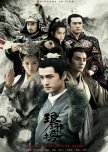
This is like a fine dining experience - to be savored and remembered. It deserves an 11/10.
Nirvana in Fire is an exceptional drama by any and all standards - nothing else I have watched comes even close to surpassing it. It truly checks all of the boxes in terms of a complex plot, an incredibly talented cast, excellent screenplay, well executed action scenes and overall movie-like visual impact and production quality.This is the story of Lin Shu's single minded quest for justice and reform. His father, a powerful general in command of the 70,000 strong Chiyan army is framed as a traitor while away defending the Liang state. Victorious but battle worn, he is slaughtered along with his entire army before they have a chance to return to the capital. Young Lin Shu barely survives and re-emerges 12 years later as Mei Changsu, the mysterious leader of the powerful pugilist Jiangzuo Alliance. His appearance is completely altered and he is a sickly, shadow of the vigorous young warrior he used to be. He returns to the capital amidst a power struggle between the crown prince and his brother Prince Yu as the Divine Talent, a brilliant strategist regarded as an emperor maker. He plays them against each other and is on surface allied with Prince Yu while he surreptitiously advances the out of favor Prince Jing. The complexity in the plot arises in the brilliant and occasionally cruel strategies he employs to uncover the full extent of the conspiracy and all those complicit in his family's murder as well as to advance Prince Jing's position. This is not a story about revenge, it is about justice. It is also about reform as justice is worthless without reform. Making abiding changes to the court and the system that would be overseen by a just and moral ruler was an equally important outcome to Lin Shu/Mei Changsu. To achieve his mission, he had to do many things he considered despicable. Cleaning out the corruption in the court was the only thing he could do to make the senseless massacre of his family and comrades in arms mean something.
This is an impossible show to binge watch - I can at best get through two episodes in one sitting. We learn from the get go that Lin Shu is living on borrowed time. That imbues the drama with an omnipresent sense of sorrow and inevitability that grows as it steadily progresses towards the end. Whenever the mood gets unbearably heavy, there are welcome moments of brilliantly timed comic relief. The first episode is probably the most difficult to follow as most of the key characters are introduced all at once .Thankfully there are many excellent character guides online that are super helpful in the beginning. There are no unnecessary characters in this show; each one was brilliantly cast and has an important role in the unfolding storyline.
The role of Lin Shu/Mei Changsu is a complex one and not at all easy to play. This was without a doubt Hu Ge's defining role and he just killed it. Time and again he was able to subtly convey a multitude of intense emotions behind a superficially stoic expression. As Mei Changsu the strategist, he was brilliant, ruthless, calculating, Machiavelli and breathtakingly cruel when necessary while battling his self-loathing for the person he was forced to become. He is filled with longing, regret and fear of discovery as he re-encounters his former love, friends and relatives under this new identity. He masterfully portrays a callous indifference that masks unbearable hurt as his actions and morals are misunderstood by his best loved friend. As they inevitably begin to recognize his old mannerisms and think the unthinkable, he cannot help but tease them with the truth before skillfully evading their suspicions. The chemistry between Lin Shu/Mei Changsu and the rest of the cast and in particular Prince Jing (Wang Kai) is mesmerizing. Twelve years later Prince Jing still misses Lin Shu, his boyhood friend and cousin and was never quite convinced the Lin family could be guilty of treason. Despite his contempt for Mei Changsu's lack of moral scruple, the principled Prince Jing's soul knows him and he is eventually drawn into a strong and touching bromance with him . Equally moving were the rare smiles, flashes of humor and fatherly affection that emerges when Lin Shu/Mei Changsu teases Fei Liu, his lethally skilled and fiercely loyal boy protector. Despite his crushing physical weakness, he desperately lies to shield his loved ones from the extent of his suffering and true condition. I found myself grieving for not only the lost friendships and love affair that could have been but for the Lin Shu that Mei Changsu can never become again.
The character development in this drama is so sophisticated and multi-layered that even the worst villains of the piece are to evoke a sense of pity for their human failings and have some redeeming aspects. The story builds towards an epic climax that sees Lin Shu/Mei Changsu confront the person ultimately responsible for this terrible and unforgiveable betrayal. Both actors in this final showdown were phenomenal but I think the tyrant's rant from rage,to hubris, to denial, to defeat , to defiance and then finally to almost but not quite remorse truly blew me away. It is in this encounter that Lin Shu delivers his most excoriating, most tragic and and most damning indictment -"If you knew your son you would never believe he could betray you. If your son knew you, he would not have refused to believe you betrayed him." The script writing is powerful and we are treated to many emotionallly loaded lines but for me, this one was the one that summed up the root of the tragedy and made me weep for both of them. But Lin Shu/Mei Changsu was beyond tears. It is this ability to convey bottomless sorrow without shedding a tear that made this Hu Ge's unparalleled performance.
{Warning - Spoiler ahead]
I love it that this show pretty much ends after the climatic peak with most of the loose ends tied up well ahead. Even though we know from the very beginning that Lin Shu/Mei Changsu dies, it still broke my heart. Nonetheless, the drama comes to a very fitting and satisfying end. While this was an enthralling, immersive journey from start to finish, I think I need to take a break with something less intense. I suspect this will remain the very best drama I have ever seen for a long time although I still love Ten Miles of Peach Blossoms best.
Vond je deze recentie nuttig?

Gangsta's Paradise
I bounced off walls with joy and excitement when I came across this movie. It has been too long since we have seen a hard core Hong Kong style triad martial arts movie like this. Not to mention the cast - Louis Koo, Sammo Hung, Raymond Lam; literally a Who's Who of veteran Hong Kong action super stars. Adapted from Andy Seto's manhua "City of Darkness," this movie is set in the 1980s in the Kowloon Walled City, or Hak Nam/黑暗 as it was known to locals. Dismantled in 1993, this was once the most crowded place on earth, packing 35,000 people within 6.4 acres. This infamous den of iniquity was a gangsta's paradise; a dystopian, lawless enclave of mostly refugees where crime proliferated and triads kept the peace with their own brand of street justice. The replica of the Walled City is viscerally authentic down to the chaotic claustrophobia of structure piled precariously upon structure and the stench of overflowing humanity permeating the dank, narrow corridors.This fast-paced action-packed movie that pays tribute to the golden age of Hong Kong cinema exploits tried and true themes of loyalty, brotherhood and vigilante justice. Chan Lok-Kwun (Raymond Lam) is a mainland refugee that sneaks into HK in the 1980s. He runs afoul of triad boss Mr Big (Sammo Hung) and in a thrilling chase, jumps from the frying pan into the fire of the Walled City. Through blood, sweat and bone-crunching fights, he earns the grudging respect of Typhoon and his underlings, who keep the peace within the Walled City. The narrative rushes through not that well fleshed out subplots involving past grudges and shady business deals but who cares? They are simply excuses to stage one innovative, physics defying action scene after another featuring fighters dressed to kill at 1980s comic-con. While Typhoon and his rival Mr Big anchor the narrative, the younger crew really hold their own up against the intimidating cast. I laughed out loud at their moments of dark humor and brash camaraderie.
One of this movie's top highlights is the the gritty, awe-inspiring recreation of the dystopian underworld within the Walled City; a place that spawned countless video games and works of fiction. The action scenes pay tribute to the manhua with outlandish cartoon-like combatants and the death proof brawls featuring wildly exaggerated superpowers. The fight scenes got more fantastical as the movie progresses and climaxes in a crazy, all-out extended take down of an almost invincible villain. I was on the edge of my seat with excitement and anxiety the entire time; thinking more than once that the bad guy was gonna win. Nonetheless I felt the best fights were early on, where despite the astounding athleticism, they were still grounded in some semblance of reality. I had my heart in my mouth watching Chan Lok-Kwun's opening shattered glass skirmish, the way he fights his way out of tight spaces on the bus and his parkour like first foray into the Walled City. This is how real martial arts action scenes should be choreographed and filmed. Later on, while still inventive and gripping, the action strays a bit too far into the realm of the fantastical.
This movie is a must watch and not just for old times' sake; preferably in Cantonese and on the big screen. It shows that Hong Kong cinema is still alive and well and stands the test of time. I am only rating this an 8.0/10.0 because the plot could have been better but the overall entertainment value vastly exceeds this rating.
Vond je deze recentie nuttig?

Catch me if you can!
Thirteen Years of Dust is the best Light On/Mist Theatre suspense thriller iQiyi has released since The Bad Kids and The Long Night in 2020. This tightly written mystery cum police procedural is gripping from the start. An eerily staged crime scene reminds Lu Xingzhi of a serial killer that had terrorised Nandu thirteen years ago, when he was just a rookie detective. Starting with his mentor Wei Zhengrong, he gets the old investigative team that had profiled and hunted the killer back together again. They have unfinished business to get down to. Thus begins a thrilling chase for the long hidden killer who seems to be taunting them, "Catch me if you can!"The way the narrative unfolds in parallel between the present and the past is mesmerising and immediately made me invested in the main characters, including potential antagonists. In the present, the characters are older yet wear unmistakeable vestiges of the past that make them seem still touchingly familiar. We see what they were like juxtaposed against what they have become. This invokes a haunting sense of nostalgia over what was lost and what could have been. This captures the essence of what made CBS's Cold Case one of my favorite police procedural series. Wei Zhengrong seems the most markedly affected. In sharp contrast to the rather rough, dismissive, and bitingly cynical cop in his prime, he becomes a muted, wiser and oddly broken shadow of his former self. Lu Xingzhi on the other hand has delivered on his early promise and come into his own but his family life is disrupted.
Chen Jianbin and Chen Xiao anchor the stellar cast in this production. Both are charismatic and convincing actors with such incredible chemistry that it evolves to reflect the passage of time. They each subtly take on some of the other's traits thirteen years later, indicating how deeply they influenced one another. It is not easy to play characters that have aged and changed over thirteen years, yet remain essentially that character. Beyond both leads, every main character in each of the many cases delivers riveting portrayals of both their younger and older selves. This brought the victims to life through the eyes of people who knew them, loved them, feared them, envied them and may very well have killed them! The side story that moved me most was that of the gangster and the dancer.
The plot is very well designed and is a lot more whodunit than howdunit. It is set in a time when use of forensic technology was nascent and primitive. So the cases had to be approached the good old fashioned way of narrowing down suspects to who had motive, means and opportunity. The evidence and clues are all presented in an even handed manner; there is no attempt to hide anything from the viewer. From early on, the audience has enough clues to credibly build a case around at least two suspects at any given time. While the solution is not a huge surprise as the killer is well concealed but far from invisible, it still comes with a decent twist. It is a surprisingly dark story with a chilling ending for a c-drama. The production maintains an unsettling tension of a disturbing and menacing presence throughout. If I have to criticise, the staged crime scenes are a bit pretentious and the explanation of the painting and its significance is on the weak side although it just passes muster.
Overall, this is a well written and nicely executed crime thriller that will satisfy exacting crime buffs. A highly recommended watch that I rate 8.5/10.0.
Vond je deze recentie nuttig?

Soul searching.
This is an absorbing sci-fi suspense thriller built around themes relating to the immortality of the soul and its ability to reincarnate after death. The city's top prosecutor Liang Wen Chao (Chang Chen) takes on a high profile, inexplicable and grisly murder of a terminally ill tycoon. As Wen Chao examines the key suspects - the son, the young wife, the deceased ex-wife and the business partner, cutting edge technology and superstitious rituals intersect to further muddy waters already tainted by greed, love, hate, misplaced loyalty, revenge and man's futile quest for immortality.Without spoiling it, I think the whodunit aspect of it is quite well done from the way the suspicion shifts from one suspect to another until the impossible is eliminated down to what remains as the improbable truth. I did not completely buy into some of the motives of the key suspects and I was irritated by the over-acted supernatural twist that failed to deliver the chiller thriller effect it was striving for. As for the howdunit aspect I will just say it was much more fiction than science but this is the case with most sci-fi thrillers. Since it does deliver an interesting twist, it is very forgivable so just go along with it and suspend disbelief.
This movie's strongest selling point is Chang Chen and Janine Chang's performance as the core investigative team and lead couple. The kind of stoic, desperate soldiering on Chang Chen does as a terminally ill man desperate to do his best for A Bao and their unborn child with what little time he has left is heartbreaking and moving. This is really Chang Chen's best role in terms of how he conveys such deep emotions and soul searching with so few words and how his journey gives him unique insight into the victim. Beyond his incredible weight loss, I was also riveted by how effectively Chang Chen conveyed the impression of a man calling upon the last legs of his energy, whose mind is very much alive as his body fails. This is not a love story but because of amazing acting by the lead couple, I can see the depth and complexity of their unspoken emotions, how well they just fit together, understand and sacrifice for each other. This is the part of the movie that will stay with me.
Vond je deze recentie nuttig?

A wrinkle in time.
This is a surprisingly enjoyable short love story with a novel premise. He Zhengyu, a hot shot lawyer experiences a series of setbacks that lands him in a modest apartment. Every night, he is "haunted" by rookie reporter Chen Jialan, who occupied the apartment four months ago. A wrinkle in time brings them together each night at 10:06pm for 46 minutes. During this time they must solve a few cases that they were involved in professionally that may have set them on the road to perdition.The initial encounters between Zhengyu and Jialan are hilarious and intriguing as they both scare the hell out of each other. They had me rooting for them from the get go. But as their relationship progresses, I find Jialan remains too sweet, childish and cutesy. I expect to see their chemistry take on a more mature and adult tone later on but this doesn't quite happen. Nonetheless, I stayed invested in their story throughout and kept going even though the whole Jirong saga bored me to tears. I have not seen such bland and monotonous acting in a long time. It is almost criminal to pair up such an insipid actress with such a hot actor as Dai Gaozheng. The cast overall is not strong and it is Yang Xuwen's convincing and charismatic portrayal of Zhengyu and how he is changed by this wrinkle in time that elevates the main relationship and saves the entire drama.
The biggest plot hole in this story is He Zhengyu's lack of curiosity about who Chen Jialan was and why she vacated the apartment he moved into. You would think his first instinct would be to find out everything about her and to try to track her down. But no, he waits till very late in the game to do this. The cases are only mildly interesting and the villains are quite obvious. While the drama does a good job transitioning between the past and the present, the main characters traverse back and forth too often and too inconsequentially. The plot does become slightly convoluted towards the end, with too many twists. Despite some obvious flaws and plot holes, there are enough fresh and engaging moments that make this an entertaining watch. This is a 7.5/10.0 that will nicely tide over a dry spell.
Vond je deze recentie nuttig?

A kiss is just a kiss.
This drama is set in 1949 during the prelude to the Communist Party of China's descent upon Shanghai the most strategic city in China at the time; which the nationalist Kuomintang had vowed to defend. The loss of Shanghai paved the way for the CPC to sweep into power and the rest is history. Given this backdrop, it is no surprise that this drama is often mischaracterized as a spy thriller. And certainly while espionage is a prominent feature, it is not at all what this drama is really about. It is much more a slice of life drama that explores the social economic challenges and shifting political ideologies that affects friends, families and lovers at this great inflection point in modern Chinese history.I normally heartily dislike dramas set in tumultuous times like this because one cannot realistically expect happy outcomes. So I put this off for the longest time even though I am a huge fan of Chen Kun. But to my surprise, I enjoyed this drama almost from start to finish. The drama deftly avoids being melodramatic or maudlin by telling the story as a witty and intelligent dark comedy; effectively masking the sad, somewhat cynical undertone. I laughed my head off at the comical antics of the flighty widow who tries to turn back time with her first true love, a married man who is clumsily both tempted and terrified by her. It was only much later that it struck me what an ironic and cruel trick fate played on them and their families. Beyond Chen Kun, this drama is well cast with actors with excellent comedic timing.
The newly widowed Huang Liwen (Wan Chen) encounters Qiao Zhicai by chance as they both return to Shanghai. Having just lost her husband, a communist agent, Liwen tries to stay connected to him or perhaps give meaning to her loss by embracing his cause. Qiao Zhicai on the other hand is a a street savvy rogue and a bit of the black sheep of his family who ably navigates through the hyperinflation and shortages during those chaotic times. Their antagonistic initial interactions and misunderstandings blossom into a touching friendship and they become increasingly entangled into each other's lives. Together they try to protect the work of Qiao Lijie, Zicai's identical younger twin and a brilliant nuclear physicist. Their activities invite the scrutiny of the brutal secret police, putting them and their families in harm's way.
Where this drama shines is in its satirical portrayal how the main characters respond to provocation, conflict and deprivation. On the one hand, the drama mockingly lays bare the shallower, superficial and baser human traits of many of the characters and then redeems them by actions that also reveals their capacity for good. This darkly humorous depiction of familial bonds, sibling rivalry, love and betrayal as well as loyalty and friendship is vivid, hilarious and wistful. The overarching plot however will not satisfy true spy buffs although there are some thrilling, suspenseful moments and twists. It amounts to little more than a bunch of rather amateur spies pitted against a bunch of equally incompetent villains and making huge sacrifices for a mission that is ultimately of dubious historical significance.
I cannot praise Chen Kun's stellar performance in this drama enough. He pulled off both twins with such different personalities so convincingly I really believed there were two of them. Some of my favorite moments were when the brothers switch places - when Zhicai pretends to be Lijie he gives you the barest glimpse of Zhicai's concealed personality and vice versa. That is incredibly difficult to pull off and I don't believe I have ever seen it done better. I ended up loving both brothers and to me, Qiao Zhicai has become an all time favorite drama character. On the other hand, I found Wan Chen's Huang Liwen somewhat lacking. To be fair, it is a complex, messy role - a widow who is struggling to find meaning in her loss and existence. But she never convinces that her zeal for her cause is grander than love or friendship or even life itself. And she needs saving all the time. She only has three expressions - woebegone, helpless and cold. For her, a kiss is just a kiss; a means to an end with little true passion. I find her feelings for and attitude towards Zhicai unfathomable and frustrating. I don't think that is what the writers intended. Although she almost redeems herself at the end, I still find her unworthy of the sacrifices and risks Zhicai took for her.
For me this is an 8.5 that would have been a 9.0 if a better actress played Liwen. Nonetheless, I very much enjoyed the story and dark humor - it is very rare to see it done so well in c-drama. I can highly recommended watching this even though as a consequence, I suffered a major relapse and started cyber stalking Chen Kun again.
Vond je deze recentie nuttig?

We are back!!! 铁甲依然在 (tie jia yi ran zai).
Novoland Eagle Flag is about a time in fantasy world Novoland's history where the outlawed Tianqu warriors are revived for an epic showdown with growing evil forces of the supernatural Chenyue cult.These are tumultous times in Novoland, where the ruling Yin Empire only has a tenuous grip on its power over its vassal kingdoms. The emperor and the ruling nobles of the various kingdoms are protected by their own armies led by skilled generals. By coalition and mutual self interest, an unstable balance of power is maintained. Internal politics and power struggles within the empire and the kingdoms complicate the plot. These sub threads are quite well written but can be ignored or followed loosely without losing track of the story-line. This inherent instability is manipulated by the Chenyue cult who preys on the superstitions, insecurities and ambitions of the ruling elite. As war breaks out when a powerful warlord seizes power, the might of the Chenyue's undead Redteeth army grows surreptitiously with the death count. This sets the stage for the return of the formidable Tianqu warriors, historical protectors of the realm until banished for killing a despot. Only the Tianqu warriors, lead by their chief suzerain with a legendary sword, had been able to suppress the Chenyue.
Our three main characters are destined to play a critical role in Tianqu's return. They are bound together by a touching friendship as they come of age during these troubled times. Asule is crown prince of the nomadic Qingyang tribe who are fierce warriors in the harsh wintry North. He is sent at young age to Eastland as a political hostage. Yuran is an orphan from the elite of the Winged Tribe who is a princess in name at the Xiatang court. Ji Ye is the unfavored elder son of a nobleman whese mother was a concubine. They were lonely children whose paths crossed in Xiatang and essentially become each others' families. Yet they are pawns in this ruthless world where their friendship is constantly tested by ambitious and powerful actors who use them to achieve their own agendas. Asule is an idealist who wants to use his power to save the world. Ji Ye wants to prove himself, he is a conqueror who wants to rule the world. Yuran doesn't care about the world or the future, she just lives in the moment for herself and her friends. The relationship between the three leads was one of the best parts of this drama and well written. They balance each other out perfectly. Asule is a gentle soul who cannot bear to kill even when it is the only way to achieve the greater good. Ji Ye has no such reservations but his ruthless ambition is checked by Asule's goodness. And Yuran is the glue that binds them together and keeps them grounded on what is truly important - their friendship and the importance living for oneself.
The cast was very strong as this big budget production spared no expense with veteran actors. Many did not like the actress Song Zuer but I thought she was the perfect Yuran, which is not a deep character, just a very vehement one. While Liu Haoran did a good job portraying Asule, the character was poorly written and waffled in the back half. Don't hold it against him that the scriptwriter turned him into a brainless incredible hulk-like killing machine whenever he is angry. And while Chen Ruoxuan overdid the petulant youth in the beginning, Ji Ye's character is a strong one that showed tremendous growth towards the end.
The script-writing which was fantastic and gripping in the first half turned into an epic disappointment in the back half. It became repetitive, deviated into half heart-ed ill fated romantic tropes and took odd and messy turns with several core characters including Asule. I realized too late that this is the same dastardly Linmon Pictures that similarly destroyed the back half of Legend of Fuyao. It is their signature gimmick of replacing the production team with Team B so that Team A gets to move onto new projects. At that point you are so invested that you end up watching the rest of it anyway. The only thing that helped Novoland is that it is backed by the substance of a real book whereas Fuyao descended into 100 pct script-writer induced train-wreck. Given the record budget, the popularity of the novel, serious hype and the veteren cast this should have been a 9 or 10, one of the best of the year. What an epic let down - despite some truly superb battle scenes and cinematography, it ended up as just an OK overall production due to the messy writing.
The ending is controversial and felt rushed. Unlike most, I believe the Eagle Flag chapter of Novoland ended where it should have. One of the biggest misconceptions of this drama is that the story is character driven. It is not. The three leads may have their own subplots but all of the plot threads converge in the final conflict between Tianqu and Chenyue. The characters are relevant only as far as their roles in the build up to an epic climatic clash between good and evil. What happens to the characters after that is not important since the story is not really about them. A sequel or season 2 seems unlikely in this context although there could be spin offs that once again touch upon some of their subsequent paths - someone who read the books will know better than I.
Vond je deze recentie nuttig?

Sizzles while it fizzles.
A massive fire devastates Qingzhou on the night Dayan's Weibei army triumphantly reclaims the city from Xiyan. Suspected of razing the city to the ground, the Weibei army is disbanded in shame while their leader, Prince Murong Jinghe is sent to his fief. To Mei Lin whose world collapsed that day, that was not justice; far from it! Rising from the flames, she transforms herself into an elite assassin for the Shadow Works. Her first assignment is to infiltrate Dayan as a Xiyan beauty bride to assassinate the "Butcher General" Murong Jinghe. She must complete her mission with all due haste to obtain the antidote to the deadly toxin the mysterious master of the Shadow Works uses to control her.The stage is set and Murong Jinghe's entrance made my my jaw drop and my mouth go dry! Sinister and unspeakably handsome, insolent, casually malevolent and utterly unforgettable. When his cold cynical gaze collides with Mei Lin's wild, ferocious one, the screen explodes into flames. I was seated for what promised to be the ultimate revenge drama, a dark, passionate and twisted enemies to lovers story. I can't remember the last time a drama hooked me so completely from the get go. So I hushed my inner voice that protested the fact that they seemed to reveal the entire plot by episode 3. All too soon after, their thrilling dark, combative chemistry and one-upwomanship tit-for-tat turned into a moving unbreakable alliance that made them both so vulnerable I feared for them. Even though the plot falls apart around them, I enjoyed every moment of the torrid, ardent, connection between Jinghe and Mei Lin that was so effortlessly conveyed by Liu Xueyi and Wu Jinyan. They captivated me with their intense screen presence and the way their chemistry still sizzles while it fizzles through every silly, illogical, emotionally harrowing arc the script made them jump through.
This drama was by a wide margin, my biggest disappointment this year. As someone who read and more or less forgot the novel 春花厌 or Spring Flower Disgusted, I should have known that you can't make a symphony out of one note. There simply was not enough plot to do justice to the exciting concept and delicious character designs. Unfortunately Murong Jinghe, who was a ruthless scumbag for most of the novel, got whitewashed so early in the drama I thought he was body swapped into his adorable little white dog. Nonetheless, I enjoyed watching the enemies become allies and then lovers. Exceptional visuals and the couple's chemistry got me through the boring digression into the romantic filler arc that saw both leads regress into lovey dovey country bumpkins. The all-important revenge arc however disappointed me deeply as Mei Lin was unforgivably short changed of her vengeance so we never really get to see her slay as an assassin nonpareil. The drama should have ended at that arc instead of soldiering on for another mind numbingly boring eight episodes. The entire final Xiyan arc was ridiculously melodramatic and Zigu's love story was yet another filler arc, one that was in poor taste. Jinghe turns into a noble idiot who entrusts a well-meaning but incompetent young idiot with a task that was way over his pay grade. After all the blood and tears, I almost laughed out loud that they were ultimately foiled by a flower chomping, superstitious old fool. The drama comes to a full circle with the novel in that no one gets an ending that they deserve.
I won't lie - even Liu Xueyi and Wu Jinyan's phenomenal acting and charisma could not save this drama, it just made it barely tolerable. None of the other characters are interesting or well written enough to make me invested in their stories. Baron Chen's Murong Xuanlie is quite well portrayed but is too archetypal and his story and motivations quickly becomes repetitive and boring. Luo Mei's moral code is too mismatched with that of Xuanlie that as a couple, they are completely implausible. And Yue Qin was written to be such a lame character that there really was no room for Bi Wenjun to shine. What promised to be a dark and riveting story about love, revenge and justice turned out to be a sober warning about the ravages of war. Everyone from the common man to the king in the high castle is not safe and lives regretfully ever after.
This was a story that was written by four different writers and it shows. I can easily rate the first 3 episodes of this drama 8.5-9.0. After that, it barely holds an 8.0 for me and after episode 24, it is barely a 6.0. I think a fair rating overall is 7.0 but I throw in 0.5 more for Liu Xueyi and Wu Jinyan's acting to call it a 7.5. Watch at your own risk and use the FF button liberally.
Vond je deze recentie nuttig?


 53
53 196
196 8
8




















